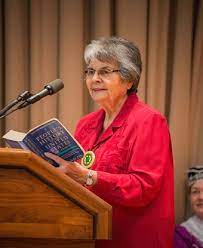Celebrating the Return of the Brothertown Collection
Contributed by Kat Griffith with photos courtesy of Oneida Nation, Raven DeLange, and Dennis Gramentz.
What do brochures, hymns, land allotments, news clippings, lists of veterans of various wars, letters, postcards, tax deeds, warranties, claims against the US government, and a manuscript of a play about the Brothertown Indian Nation all have in common?
They were all part of the collection of over 1000 pages of historic items ceremonially presented to the Brothertown Nation on July 25, 2023.

The collection of items was found by a man who inherited a farm near Brotherton. It seems he had an inkling of the stash’s worth; he offered to sell the items to the Brothertown for… wait for it… a million dollars! Needless to say, no deal was reached.
But there was a formidable and persistent Oneida and Brothertown woman — Loretta Metoxen — who took on the task of negotiating with the holder of the historical artifacts. She stayed in touch, she kept on talking, and when the items passed into other hands, she didn’t give up. She arranged for many Brothertown to see the collection, and eventually began working with Oneida member and scholar of Indian culture and history, Dr. Carol Cornelius, to ensure the collection was properly managed. Dr. Cornelius, speaking of how the Oneida came to secure the collection, memorialized the work of Loretta Metoxen saying, “We honor Loretta’s tenaciousness today!”
Dr. Cornelius also shared a personal highlight: finding a reference to her own grandmother, of the Stockbridge-Munsee Band of Mohicans, in the materials!

Eventually, after years of negotiations with the person in possession of the materials, the Oneida Nation obtained the collection on behalf of the Brothertown Nation. Continuing the long tradition of close friendship and collaboration between the Tribes, they agreed to care for the materials until the Brothertown had a proper place to keep them. Meanwhile, they digitized the collection and prepared it for proper storage.
Dr. Courtney Cottrell Gerzetich, Brothertown Tribal Historic Preservation Officer and Oneida Museum Registrar, preserved each individual piece in museum quality folders and boxes, scanned each item at high resolution, and cataloged each item. The process of cataloging documents the condition of each item, describes it, measures it, and identifies key features and places so that if the item were misplaced it could easily be reunited with the entire collection.
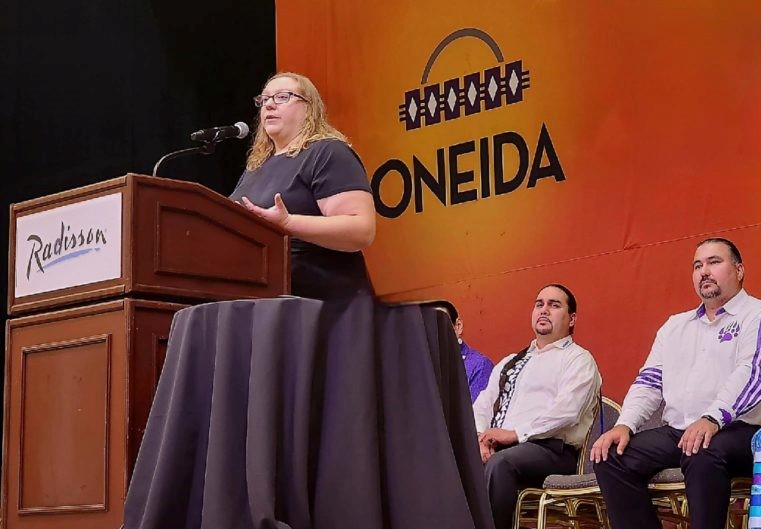
“I was laid off during the pandemic, and then my son was born. I ended up spending 400 volunteer hours on the collection — hopefully instilling in him from a very young age the importance of giving back to the community, especially during the tough times!”
On July 25, as part of the 200th anniversary celebration of the Oneida Nation in Wisconsin, the Oneida ceremonially transferred the collection to the Brothertown Tribal Council.
Brothertown Tribal Chair Phylis Tousey presented Oneida Chairman Tehassi Hill with calico, wampum, an original hand-carved eagle feather made by Brothertown artist Skip Blanc, and ceremonial heirloom tobacco from the Tribes’ shared homeland in New York.
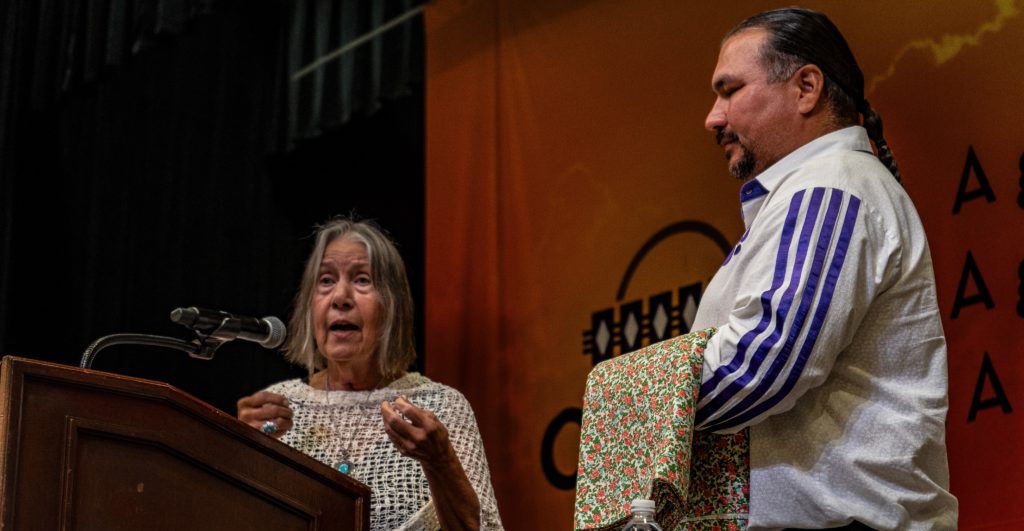
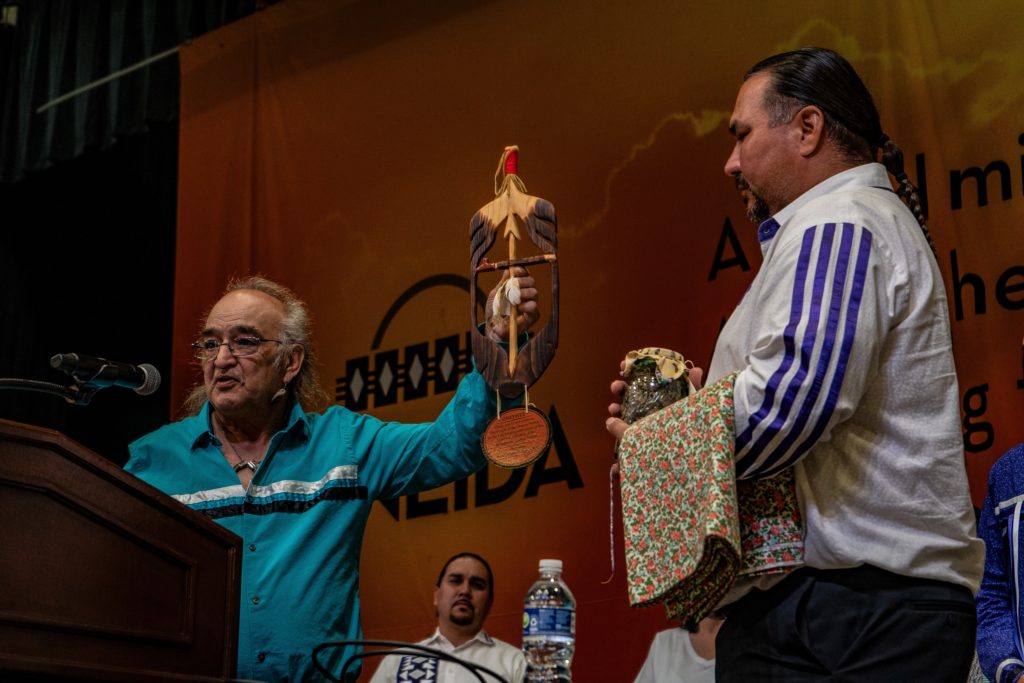
Raven DeLange, who coordinates social media for the BIN, provided the tobacco. “The seeds were gifted to me from another Brothertown Tribal member, who received them from our relatives on the East Coast. I was told they came from strains of seeds that go back over 500 years and pre-date Columbus’ arrival. I planted the seeds in my yard and harvested the tobacco myself. When I heard about this ceremony, it was really important to me to create something to give to the Oneida Tribe, as kind of a remembrance of my family. This was a once-in-a-lifetime kind of day!”
Following the presentation of the gifts, Oneida Nation singer Kana Zacarias and a group of Oneida high school singers under the direction of Charlie Doxtator performed traditional songs.
Michelle Wood, BIN Treasurer and Tribal Council member, shared her thoughts about the day. “Attending the Oneida anniversary event and listening to the speakers sharing what was created in Wisconsin through the years was uplifting. It was an honor to meet their council while sharing the history of our tribes’ collaborations. We appreciate their assistance in storing our artifacts and the ceremonial exchange! I’m proud to be part of our current council and have participated in many activities sharing our traditions. My grandfather did not share his Indian heritage with those around him because we were looked down upon. I’m proud to remind my family of who we are and the great contributions our grandfather provided to his community.”

In his final remarks on the Oneida’s history of struggle and resilience in Wisconsin, standing in front of a banner reading “A good mind — A good heart — A strong fire”, Oneida Nation member Bill Gollnick described the Oneida Nation’s decision to acquire and steward the materials for the Brothertown Nation. “It was an act of good heart and of good mind.”
Brothertown Council Chair Phyllis Tousey offered final heartfelt thanks, “We will always talk about this; this day will never be forgotten.”

The backstory: “Many hands have touched this archive”
Once upon a time near the town of Brotherton on the eastern shore of Lake Winnebago there was a man named Otto Heller. He owned a local cheese factory and was well-respected in the community. He was interested in helping the Brothertown Tribe assemble items from their history and tell their story for future generations. It was after the Civil War, and many Tribe members had items from the war: journals, soldiers’ letters home, tintypes, even a sword and scabbard. A number of Brothertown members loaned their pieces of history to Heller.
When Heller died, many pieces were in his possession. Family members who came to clean out his house did not know what they were and tossed them into a dumpster. The man who inherited the house, recognizing that these old papers might have value, reportedly climbed into the dumpster to rescue them. Looking through them he realized that they were all items relating to Indians. He purchased safe deposit boxes and put them into storage away from possible harm.
He reached out first to the Oneida Nation. Loretta Metoxen, an enrolled member of the Oneida Nation with Brothertown ancestors, recognized that the items were mostly related to the Brothertown. She began inviting Brothertown members to accompany her to see the collection and make lists of what was there. Many Brothertown — particularly those whose surnames appeared in the collection — saw and handled items; some saw parts of the collection multiple times. Bob Fowler and Robert Fowler Sr., Reggie Doxtator, Caroline Andler, Phyllis Tousey, Jessica Ryan, and Darren Konke were among those closely involved in exploring the collection during that time.
As Jessica Ryan, Brothertown Vice Chair put it, “It’s powerful putting your hands on something that your fourth great grandfather touched and wrote. It’s hard to describe the emotions that get stirred.”
The BIN was working actively on restoring federal recognition, and realized that some of the items would help make the case for restoration. They arranged for a loan of certain materials for that purpose, with Ryan and Tousey drafting a legal Memorandum of Understanding with the man who had the items in his possession. Bob Fowler and Robert Fowler Sr. were also involved in this process, and they purchased a fireproof safe deposit box to store the materials safely while they were in their possession for the restoration effort.
Eventually, Loretta Metoxen negotiated an agreement for the Oneida Nation to purchase the materials and hold them for the Brothertown. Ryan describes Loretta as “a well-respected and powerful woman within the community. She was very knowledgeable in tradition, history and custom. She had a lot of honor and integrity — if she shook your hand and said something, she meant it.”
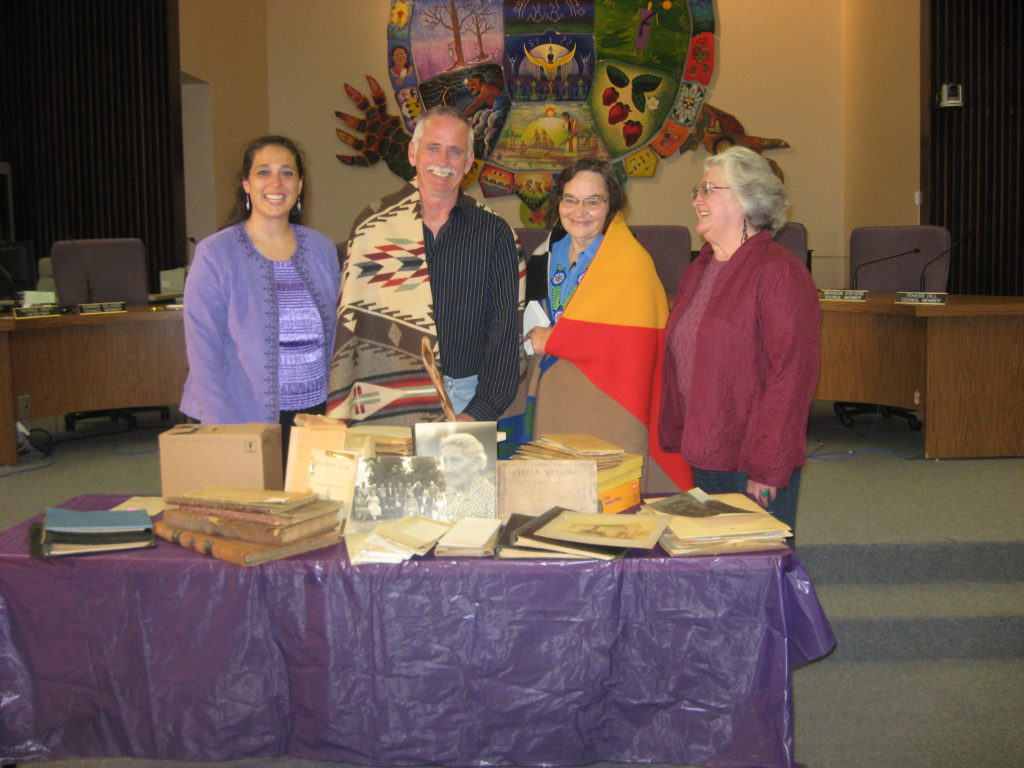
Based on the handshake agreements between the Oneida, the Brothertown, and the man who had possession of the artifacts, the Tribes planned a large ceremony for the transfer of the archive. Traditional gifts were given to the Oneida and many others involved, including the man who had had them in his possession for so many years. The gifts included traditional medicines, maple syrup harvested by BIN members, wild rice, blankets, and walking sticks carved by BIN members. Darren Kronke and Jessica Ryan told the story of the two Tribes’ interwoven history.
The Oneida received the materials into a climate-controlled facility for proper preservation. Loretta Metoxen and Reggie Doxtator (also an enrolled Oneida with Brothertown lineage) began the project of identifying and cataloging the materials. They invited Brothertown members to schedule appointments to view the collection, following proper preservation protocols for handling the items
During the next few years, Metoxen and Doxtator brought items from the collection to display at BIN events, and reported to the BIN leadership on the progress of organizing and preserving the collection. They came to the grand opening of the Community Center in Fond du Lac, the annual Homecoming, and a Pow Wow. The BIN continued to solicit donations from its members and to make small installment payments to the Oneida.
Eventually, Courtney Coutrell Gerzetich, the Brothertown Tribal Historic Preservation Officer, picked up where prior efforts left off and spent hundreds of hours completing the work of cataloging and preserving the items in museum-quality sleeves. A sample of these were present at the July ceremony with the Oneida.
Dawn Kraintz, Tribal Council member and Executive Coordinator, was part of a 2005 meeting where the Tribal Council had a chance to explore the collection, which was being held in a safe deposit box at a bank. “There was a court book, textbooks, a hymnal, letters from men at war, pictures — I saw a picture of my great-grandfather! It was emotional to touch that stuff. And when I went to the 200th Anniversary Celebration with the Oneida, it was like a full circle. Those things are coming back where they belong. It was so heartwarming that the Oneida were watching over us and helped us preserve our heritage.”
The actual physical transfer of the entire archive held by the Oneida took place at the August meeting of the Brothertown Tribal Council.
Jessica Ryan says, “I really want to call out the people who helped us get to this point. There were lots and lots who played important and crucial roles — too many to name and I’m afraid I would leave some out if I tried to make a list!”
You know who you are — and we hope you will come see the collection when you’re in the area! In the meantime, you can look forward to articles on some individual pieces in future newsletters!


